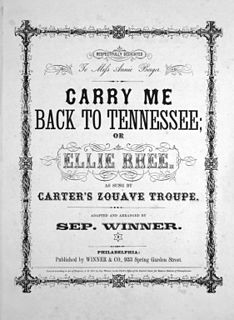"The Bonnie Earl o' Moray" is a popular Scottish ballad, which may date from as early as the 17th century.
"The Wife of Usher's Well" is a traditional ballad, catalogued as Child Ballad 79 and number 196 in the Roud Folk Song Index; it is originally from Britain but is also popular in North America. No complete original version has survived, but the song has been 'remade' in America in a cohesive form.

Septimus Winner was an American songwriter of the 19th century. He used his own name, and also the pseudonyms Alice Hawthorne, Percy Guyer, Mark Mason, Apsley Street, and Paul Stenton. He was also a teacher, performer, and music publisher.
The Famous Flower of Serving-Men or The Lady turned Serving-Man is a traditional English language folk song and murder ballad. Child considered it as closely related to the ballad The Lament of the Border Widow or The Border Widow's Lament.
"Unusually, it is possible to give a precise date and authorship to this ballad. It was written by the prolific balladeer, Laurence Price, and published in July 1656, under the title of The famous Flower of Serving-Men. Or, The Lady turn'd Serving-Man. It lasted in the mouths of ordinary people for three hundred years: what a tribute to the work of any writer, leave alone the obscure Laurence Price. Oral tradition, however, has made changes. The original has twenty-eight verses and a fairy-tale ending: “And then for fear of further strife, / he took Sweet William to be his Wife: / The like before was never seen, / A Serving-man to be a Queen”. - Roy Palmer, A Book of British Ballads
"Young Hunting" is a traditional folk song, Roud 47, catalogued by Francis James Child as Child Ballad number 68, and has its origin in Scotland. Like most traditional songs, numerous variants of the song exist worldwide, notably under the title of "Henry Lee" and "Love Henry" in the United States and "Earl Richard" and sometimes "The Proud Girl" in the United Kingdom.
"The Cruel Brother" is a folk song.

"Michael, Row the Boat Ashore" is an African-American spiritual first noted during the American Civil War at St. Helena Island, one of the Sea Islands of South Carolina. The best-known recording was released in 1960 by the U.S. folk band The Highwaymen; that version briefly reached number-one hit status as a single.
Brisbane Ladies is an Australian folksong and is one of many adaptations of Spanish Ladies. The version given below is the most commonly sung, but the original mentions Nanango favorably as "that jolly old township". The song is also known as "Augathella Station".
"The Sweet Trinity", also known as "The Golden Vanity" or "The Golden Willow Tree", is Child Ballad 286. The first surviving version, about 1635, was "Sir Walter Raleigh Sailing In The Lowlands ".

Odetta Sings Ballads and Blues is the debut solo album by American folk singer Odetta, first released in March or April 1957.
"Bonnie Annie" is a folk ballad recorded from the Scottish and English traditions. Scottish texts are often called Bonnie Annie or The Green Banks of Yarrow, English texts are most often called The Banks of Green Willow. Other titles include The Undutiful Daughter, The High Banks O Yarrow, The Watery Grave, Green Willow, There Was a Rich Merchant that Lived in Strathdinah and The Merchant's Daughter.
"The Trees They Grow So High" is a British folk song. The song is known by many titles, including "The Trees They Do Grow High", "Daily Growing", "Long A-Growing" and "Lady Mary Ann".
Nowell Sing We Clear is a four-member musical group that performs an annual yuletide concert series. They have also released a series of related albums.
The (Bonnie) Rantin' Laddie or Lord Aboyne is a traditional Scottish folk ballad telling of the valiant rescue of his lover by a noble Highland lord.

Absolutely the Best is a compilation album by American folk singer Odetta, originally released in 2000.

The Tradition Masters is an album by American folk singer Odetta, released in 2002.

The Capitol Years is a compilation album of the American folk music group the Kingston Trio's recordings from their time with the Capitol Records label.

Close-Up is the eleventh album by the American folk music group the Kingston Trio, released in 1961. It was the first release by the group after the departure of founding member Dave Guard. The Trio now consisted of Bob Shane, Nick Reynolds and Guard's replacement John Stewart. Close-Up peaked at number three on the Billboard charts. The lead-off single was "Coming from the Mountains" backed with a non-LP track, "Nothing More to Look Forward To". Close-Up was nominated for a Grammy award in 1961 for Best Performance by a Vocal Group.
Jolly Roving Tar is a traditional Newfoundland folk song. In its 19th-century version, the song relates the story of Susan, lamenting the wanderings of her beloved "tar", or sailor, William, who is at sea, and deciding to follow him in her father's boat. The title is also applied to the folk song* "Get up, Jack! John, sit down!", a reel of unknown provenance in which some, but not all, versions includes the line, "Come along, come along, my jolly brave tars, there's lots of grog in the jars."
Oscar Brand was a North American folk singer, songwriter, author and radio host. He released nearly 100 albums and composed hundreds of songs, among them Canadian patriotic songs, songs of the U.S. Armed Forces, sea shanties, presidential campaign songs over the years, and songs of protest. His discography is extensive.
This page is based on this
Wikipedia article Text is available under the
CC BY-SA 4.0 license; additional terms may apply.
Images, videos and audio are available under their respective licenses.






